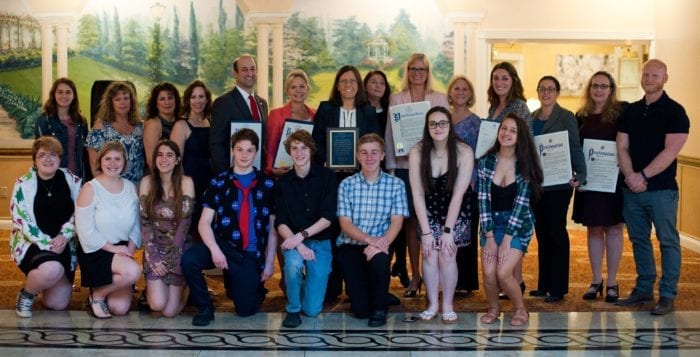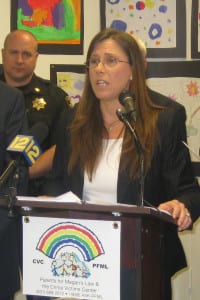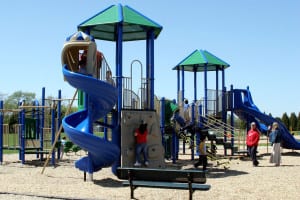The North Shore Youth Council has dedicated its attention to children across the local hamlets, but last week the organization thanked one group which looks to stop sexual violence against minors.
More than 150 students, their families and elected officials packed the ballroom of Majestic Gardens in Rocky Point, as the NSYC hosted its Big Buddy-Little Buddy and Volunteer Celebration May 20 and honored Laura Ahearn, an attorney and the founder and executive director of the Parents for Megan’s Law and the Crime Victims Center for her dedication to helping youth in the community.
“Between our programs and Laura’s organization, I think this will heighten this topic.”
— Janene Gentile
The council presented Ahearn, who recently donated $5,000 to NSYC to develop the Laura Ahearn Resilience Scholarship, with an award and plaque.
The scholarship will be given to high school students who have overcome sexual abuse to pursue a post-secondary education, and will be distributed in $1,000 increments during the next five years as students pursue higher education.
Janene Gentile, executive director of NSYC, said the council is very grateful to be receiving the grant funds.
“We are very excited to be giving this scholarship to a student, hopefully in September,” she said. “Between our programs and Laura’s organization, I think this will heighten this topic.”
Ahearn said it meant a lot to receive an award from such an active organization
“I want to thank them for all the great things they do in the community,” she said.
The attorney said the council does a lot to protect kids from becoming sexual abuse victims.
“For me, I’m really grateful that there are so many volunteers and people who want to dedicate their lives to help kids,” she said. “When kids don’t have the support they need, they become very vulnerable.”
Ahearn said it is very meaningful for her to be able to give out these scholarships, along with the support of the many people that made it possible for her to help people in the community.
The attorney said the project has come full circle for her.
“I wanted to give back to an organization that took the time to listen to me when someone wouldn’t 20 years,” she said.
During her acceptance speech, Ahearn spoke about her 25-year journey, her experiences with her organization and the importance of sexual abuse prevention.
“The only way to stop this epidemic is to educate folks in the communities, educate your children and yourself,” she said. “Sexual predators are not strangers, they look like you and me, they act just like you and me — you would never know.”
The NSYC’s Big Buddy-Little Buddy program, which began in 1993, gets high school students paired up with younger children to become mentors for them. They engage in a variety of group activities that demonstrate, encourage and reinforce social competency skills.
“This is a celebration of our peer mentorship programs,” Robert Woods, the director of youth development at NYSC said. “Whether it’s helping them with homework, or talking about their day, it gives them a safe space to open up.”
This summer Brookhaven National Laboratory will collaborate with the Rocky Point nonprofit to offer a free STEM program. In addition, they will be working with the Staller Center at Stony Brook University to bring in young musicians to work with the children in the program.








